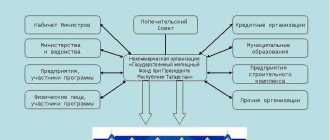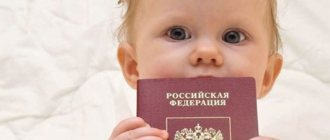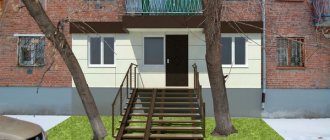Low-income family status in 2021
The average per capita income of a low-income family is below the subsistence level. Such a family is entitled to social benefits and subsidies. However, to receive assistance you need to register as a low-income family.
The family consists of close relatives who live with the owner (user) of the apartment and manage the household with him. For example, husband, wife, children, brothers and sisters. Children may be natural or adopted. Sometimes children are raised by grandmothers. Such families are also entitled to help.
On a note! When calculating income, the family does not include military personnel and students of military universities. As well as citizens serving sentences in prison and persons who are fully supported by the state.
The status of a low-income family must be confirmed not only by low income, but by other important circumstances. For example, a person finds himself in a difficult life situation and cannot find a job. This fact is confirmed by a certificate from the employment center. This also includes maternity leave for the expectant mother. If people do not want to work and lead an immoral lifestyle, then such a family is not recognized as poor.
Help with housing and communal services payments
Low-income families have the right to apply for a discount on housing and communal services.
The essence of privilege
Low-income families are provided with partial subsidies as benefits for utility services. Compensation comes to the applicant’s personal account. A citizen can wait for funds to make payments from them, or he can pay for housing and communal services in full from his own savings, and spend the assistance received on personal needs.
To receive the privilege, it is important that utilities are eventually paid. If the beneficiary received compensation but did not fulfill the obligation to the management organization, he risks losing the right to the subsidy and receiving a demand for a refund.
What are the restrictions?
The right to receive benefits depends not only on family income, but also on some other factors. The amount of payment for utilities per month is taken into account. It should be more than 22% of the earnings of beneficiaries. For example, if the profit is 25 thousand rubles, and 7 thousand are spent on housing and communal services, then this is already 28% of the income, which means that there is a right to the privilege.
If the cost of services was 5 thousand, this would be only 20% of the family income. In this case, low-income people are not entitled to claim a subsidy.
It is important to take into account that 22% is the maximum percentage; regional authorities can set the figure lower, for example, in the capital this figure is 10%.
The next condition is the absence of debts to the management company. They will not be granted a privilege; you will need to repay the debt in full. If the volume is too large, it is possible to ask the organization for payment in installments.
The number of square meters of living space is also taken into account. A single family member should have no more than 33 sq.m. to receive compensation. If two people live - 42 sq.m. for each, if three or more - 18 sq.m. per person.
If the square footage is larger, this does not mean that it is impossible to apply for the benefit at all. It’s just that the above meters will be taken into account, and for the rest of the area you will have to pay entirely from your own savings.
And the last influencing factor is the legality of living in the home. The privilege is given to:
- owners of an apartment or house;
- tenants who have an appropriate agreement;
- cooperative members;
- citizens using housing on the basis of a social rental agreement.
For example, if the owner of the property is a grandmother, she has registered her son, his spouse and children in the premises, but she does not live in it, then the registered persons are not entitled to receive a subsidy. If a woman lives with them and the income for all 4 people is below the minimum, then you can count on government support.
Support for low-income families in Moscow
The Moscow government actively supports low-income citizens. They can count on one-time, annual and monthly payments. The only condition is the presence of Moscow registration.
The amount of payments depends on the status of the family or SHG recipient. Low-income residents of the Moscow region are entitled to child benefits from 0 to 3, from 3 to 7, from 8 to 18 years.
Benefits for large families:
| Frequency of payments | Type of assistance | Special purpose |
| Monthly | Cost reimbursement | Rising cost of living; Purchasing children's goods; Payment for housing and utility services; For using the phone |
| Annually | Payments | For International Family Day; For the Day of Knowledge; To buy children's clothes for going to school (also for disabled people) |
| One time | Payments | Citizens who have been awarded the “Parental Glory” badge... |
Disabled families are entitled to a monthly payment in connection with the care of a disabled child and a survivor's benefit. The full list of benefits and amounts of social payments are fixed by the Moscow PP dated 12/16/2020 No. 2260-PP.
More useful information on types of support for low-income families can be found on the website of the Moscow Mayor.
When can a subsidy be denied?
Subsidized assistance may be denied for several reasons. The most justified:
- The family has debts to housing and communal services representatives.
- There is no Russian citizenship, registration is temporary.
- The family does not have low-income status because the income level is sufficient to pay the payments.
- An incomplete package of documents was provided, the information is unreliable.
It is also worth noting that financial assistance payments may stop ahead of time without notice. This can happen if the composition of the family has changed, monthly profits have increased, and social security authorities have not been notified about this.
Regional assistance to low-income families
The government of the constituent entities of the Russian Federation strongly supports low-income citizens. Types of assistance:
| Region | Types of support |
| Moscow | Free travel by all types of public transport, camp vouchers and special meals at the dairy kitchen Compensation for communication costs Subsidies for housing maintenance and utility bills |
| Saint Petersburg | Child benefit |
| Voronezh | Free provision of land for housing construction |
| Murmansk | Vouchers to the camp |
| Udmurtia | Full or partial repayment of the mortgage from budget funds |
| Rostov | Camp vouchers or reimbursement Child benefit |
What income is considered for the subsidy for low-income families?
Only low-income citizens receive social assistance for rent subsidies if such status has been established by local governments. In 2021, the average income per family member is taken into account . To do this, they add up all the money they have.
IMPORTANT! The income for the last three months is summed up.
Total income consists of:
- salaries, vacation pay, sick leave payments;
- social payments for any family member;
- various compensations;
- benefits that a citizen receives upon retirement;
- income from rent of movable or immovable property;
- royalties, stock income, alimony and other payments.
All income is confirmed by certified certificates and copies, extracts.
How to calculate income to obtain low-income family status
You can make the calculations yourself. The income of all family members for 3 months is taken as a basis. The list of income is determined by the Russian Federation Regulations dated August 20, 2003 No. 512. The available data must be added and divided by three. This is how we determine the average family income. The resulting figure must be divided by all family members. After this, the average per capita income must be compared with the minimum wage. If it is less than the specified amount, then the family is entitled to an allowance.
You can also use the calculator on the website of the Ministry of Social Development of the Perm Territory. The user needs to indicate the number of family members and income for three months. This includes wages at the main place of work, social benefits, alimony, interest on deposits, dividends and income from renting out an apartment. When filling out the form, income before deduction of personal income tax is taken into account (Article 7 of the Federal Law dated 04/05/2003 No. 44-FZ).
If the income is below the minimum wage, the system displays the result and prompts what documents should be prepared and where they should be submitted.
What benefits do the poor enjoy when paying for housing and communal services?
What benefits are there for housing and communal services?
When paying for housing and housing and communal services, a low-income family receives free government assistance. It applies not only to home owners, but also to tenants. Subsidies are provided for 6 months.
After this, if necessary, you need to fill out the documents again. If during this time the income or number of people in the family has changed, the amount of the subsidy is recalculated.
The payment is calculated depending on the local standard for the cost of housing and communal services for each family member. Receipts for actual utility payments are provided to the Social Security Administration. The family is paid the difference between actual payments and standard amounts for all family members.
The amount of payments varies for individual regions.
To receive a subsidy from the state, the amount of actual utility payments must be more than 22% of total family income.
Required documentation when applying for benefits
To obtain assistance you will need the following documents:
- Statement.
- Applicant's passport.
- Certificate of income for the quarter.
- Excerpt from the house book.
- Documents on expenses incurred (treatment, funeral payments).
- Evidence of lack of income (certificate from the Central Employment Service, FSSP). Citizens need to be guided by the provisions of the Moscow GD dated December 28, 2004 No. 911-PP.
Sometimes additional documents may be required. More details about the types of assistance in Moscow and the list of documents for each of them are here.
Information about the financial status of the family must be confirmed annually, from January 1 to August 31. You can update your data on the website mos.ru or through the Central State Administration “My Documents”. The action is performed through your personal account.
How is the subsidy paid to low-income families to pay for utilities?
The most common way to receive assistance from the state is to transfer a monthly subsidy to a personal account.
But in many localities it is common practice to receive money through the mail. State subsidies for low-income families to pay for utilities are issued for six months . When the period expires, the citizen, if he still has low-income status, needs to collect the documents again.
Design specifics
The procedure for obtaining the status of a low-income family depends on the region. The best option is to submit an application online (the State portal) or sign up at the MFC in advance. This will avoid wasting time and standing in queues. The period for issuing a certificate is 8 days. After this, the applicant will be given a document stating that he is registered with the USZN.
List of documents for obtaining a certificate:
How to submit a request for low-income people, get support and how long will it take?
First of all, we collect all the necessary certificates and make copies. We visit housing and communal services to obtain a complete register. We come to the local government and write a statement. We hand over everything personally to the social protection worker. We are waiting ten days to provide a response.
Depending on the queue, sudden difficulties or questions, the application may be considered within two weeks.
After this period, the family receives confirmation or denial of benefits in writing.
Sample application for a subsidy
Subsidy period
Help is urgent. This is temporary support for people who really need it.
The application for receipt will be considered ten days from the date of submission. If not all documents are provided, there is a high probability of refusal. Refusal can only be in writing, indicating the reason. This is done so that the applicant can appeal the administration’s decision in court.
The assistance will be valid for six months. If this time was not enough, you can submit the request again.
The authorities do not require people to improve their quality of life for six months by receiving benefits for utility bills. Therefore, after the deadline, you do not need to provide any additional certificates. An application for benefits can be submitted several times in a row. At the same time, the number or size of benefits for utilities for the poor will not decrease.
Benefits for paying for housing and communal services are issued not in money, but in the form of various products and compensation for utility costs.
The time to receive first aid depends on the deadline for submitting all necessary documents. If this was done at the beginning of the month, then payment benefits can be received at the end. If the subsidy request was granted at the end of the month, assistance will only be received at the beginning of the next.
What could be the reasons for refusing a subsidy?
There are times when a subsidy may be denied. Within ten days from the date of receipt of the application, a commission may come to the house with an inspection. Income levels and recent purchases will be checked. If it has been decided that the citizen lives in abundance, the commission may refuse to provide assistance. But this does not mean at all that if they have a car or computer, housing and communal services benefits will be denied to the poor.
This refusal can be appealed in court. After all, furniture and other expensive items could have been bought by the parents of the owners of the house.
The commission will also interview neighbors of the house. She will ask about the behavior of the residents and whether they are renting out the house.
- A stranger, possibly a relative, is registered in the apartment. The applicant must provide evidence that the outsider does not reside in the area.
- Expensive purchase. The commission decides everything here. If they see the presence of valuable items, this will not affect the subsidy. But there comes a time when a person sells his home and buys a cheaper one. Living conditions have decreased. In this case, the commission may refuse.
- Incorrectly provided documents. The subsidy will not be awarded until the violations are corrected.
Terms of service completion
The time frame for consideration of an application depends on the legally significant action. For example, you can obtain the status of a low-income family in 8-10 days. However, the period may be extended indefinitely if the applicant has not provided all documents, and to obtain them it is necessary to contact government authorities.
The decision to pay benefits or provide a housing subsidy is made within 10 days. Whereas for financial assistance, a decision is made within 30 days (Moscow).
How to apply for a subsidy
How to apply for subsidies?
If income calculations show that the family can be classified as low-income, then you can immediately start collecting documents and contact the Social Security authorities at your place of residence. It is also possible to contact the MFC.
It is necessary to write an application to recognize the family as low-income.
After writing the application and submitting the documents, you will need to wait for a response within 3-4 weeks. Reasons for refusing to recognize a family as low-income may be:
- lack of any documents;
- their incorrect design;
- unreliability of data.
If you disagree, you can file a statement of claim in court.
What other help does a low-income family receive?
Low-income citizens are entitled to food and clothing assistance, as well as subsidies for housing and communal services. Let's consider each type of financial support separately.
Food aid
Interested parties need to prepare documents and visit the social service center (SSC). The commission will review the application and make a decision. If it is positive, the applicant will be notified by a social worker.
If they have a Muscovite social card, citizens are issued an electronic certificate. RUB 2,000 will be credited to the card, which can be used to purchase food. The certificate is valid for 1 month. You can find out the list of available stores by number (from 08:00 to 20:00).
The rest of the citizens are given food packages. More detailed information about the conditions for providing food assistance can be found on the website of the Moscow Mayor.
Clothing assistance
The procedure for obtaining targeted clothing assistance is almost the same. The applicant needs to collect documents and visit the CSC. If the decision is positive, the applicant will be given a certificate for 2,000 rubles. The money is credited to the Muscovite’s social card. Targeted assistance is also provided in kind. Purchases of goods are made only in special stores.
Housing benefits
Low-income citizens are entitled to a subsidy to pay for housing and communal services. It can be obtained by home owners, users (tenants) of premises and members of housing cooperatives.
To receive a housing subsidy, you must have Russian citizenship, registration in a specific region, and no debts to pay for housing and communal services. At the same time, more than 10% of family income should be spent on paying for services. When calculating the indicator, you need to take into account the maximum income for a particular family (3-5 people). You can get acquainted with the figures for Moscow on the website of the State Public Institution GCZhS.
On a note! Housing subsidy is provided for six months. The recipient then needs to resubmit the documents.
What benefits are available to the poor?
What benefits are available to the poor?
Both federal and regional authorities provide assistance to the poor. Main benefits for the poor:
- payments for children until they reach 18 years of age;
- subsidies for housing and communal services;
- subsidies for improving housing conditions.
Material support is provided in the following form:
- allocation of funds;
- provision of clothing, food, fuel;
- provision of medicines;
- partial payment for housing and communal services.
In addition to the usual methods of social assistance, low-income families, depending on their area of residence, receive one-time targeted payments before the start of the school year to prepare their children for school. Breastfeeding and pregnant women are provided with funds for increased nutrition.
Students from low-income families are entitled to a social pension
Children students are entitled to a social scholarship from the state. At the birth of the 3rd and subsequent children, the family is entitled to a monthly allowance.
Children from such families enjoy benefits upon admission. If a family is recognized as low-income, then it is also provided with a subsidy to improve housing conditions or provide municipal housing. Low-income families enjoy tax breaks.
Possible problems
Difficulties sometimes arise when applying for benefits or subsidies. For example, when a family cannot provide social security with documents about the income of a missing relative. In this case, a certificate from the police about the initiation of a criminal case or a court decision will be required. Interested parties will have to file a police report.
Additionally, citizens may need a document from a university, medical institution, prison, or about serving under conscription (contract). The list of documents and possible difficulties with their preparation depend on the situation and type of state assistance.
Payments of benefits or subsidies are terminated upon expiration or if family income increases.
Arbitrage practice
The prosecutor appealed to the Baltic City Court with a demand to return to the state budget the subsidies that citizen I. Yu. Zharnovnikova received illegally.
The plaintiff said that for a certain period the woman provided false information about the amount of her husband’s income. Therefore, she unreasonably received financial assistance from the state. Having identified this fact, she was asked to return the money, but she refused.
The defendant did not appear at the court hearing, asked the judge to consider the case in her absence, and did not admit the claims. In her written explanation, the citizen noted that she did not have any deliberate intent to provide false information.
Moreover, even if the information about her husband’s income were correct, she would still have the right to subsidies. Therefore, he proposes to return only that part of the compensation that was obtained illegally, and not the full amount.
The court, having studied the case materials, decided to partially satisfy the prosecutor's claims, obliging the defendant to return only the amount of subsidies that was received unreasonably. The refund should be recalculated taking into account reliable information about the spouse’s salary.








